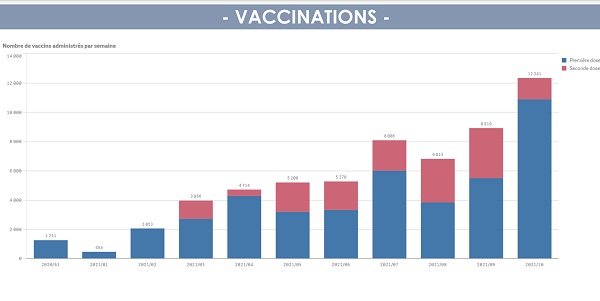 Blue: first vaccine dose; pink: second dose;
Credit: MSAN
Blue: first vaccine dose; pink: second dose;
Credit: MSAN
In its latest COVID-19 report, Luxembourg's Ministry of Health confirmed that the number of COVID-19 cases had gone up 5% last week compared to the week before.
For the week of 8 to 14 March 2021, the number of residents testing positive for COVID-19 increased from 1,194 to 1,249 people (up 5%) over one week. The number of identified contacts increased from 2,847 to 3,669 (up 34.5%). The number of PCR tests carried out over one week also increased from 61,564 to 63,675.
As of Sunday 14 March 2021, the number of active infections stood at 2,752 (compared to 2,860 as of 7 March) and the number of people having recovered from the virus increased from 53,152 to 54,481. The number of weekly deaths was 28 (up from 24), with the average age of those standing at 83.
There was a clear increase in hospital admissions, with 95 COVID-19 patients being treated in normal care and 27 in intensive care, compared to 86 and 21 respectively the previous week.
The two COVID-19 consultation centres (CCC), located in Luxembourg-Kirchberg and Esch-sur-Alzette, have recorded a total of 9,539 visits to date, including 583 visits last week (compared to 457 the previous week).
For the reference period, the effective reproduction rate (RT eff) remained stable at 1.03 (compared to 1.00% the previous week), as did the positivity rate on all tests carried out (1.96% compared to 1.94% the week before; average over the week).The positivity rate on tests performed through a doctor's prescription (people with symptoms) decreased from 5.03% to 4.91%.
The incidence rate was 200 cases per 100,000 inhabitants (down from 191) over seven days. The 0-14 age group recorded the largest increase (up 24%) over one week, followed by the 30-44 age group (up 16%). The incidence rate dcreased in the 75+ age group (down 25%) but remained stable in all other age groups. The 0-14 and 15-30 age groups now have the highest incidence rates while the 60-74 age group continues to have the lowest incidence rate. The average age of people diagnosed with COVID-19 dropped to 37.
For the week of 8 to 14 March, 2,594 people were in isolation (down 6%) and 3,725 were in quarantine (up 21%).
The family circle remained the most frequent context of transmission of COVID-19 infections (44.3%), followed by the workplace (6.2%), the education environment (6.0%), the healthcare sector (4.5%) and the leisure environment (3.9%). The source of infection was not clearly attributable in 30.1% of cases (down from 37.4%).
Vaccinations
For the week of 8 to 14 March, a total of 12,341 vaccine doses were administered in Luxembourg: 10,892 people received their first dose whilst 1,449 people received their second dose. At present, the Luxembourg authorities expect to have enough doses to vaccinate a total of 123,379 people by the end of April 2021. Allowances are likely to be adjusted from week to week according to the production capacities of manufacturers and deliveries.
COVID-19 Variants
For the week of 1 to 7 March 2021, population sequencing coverage was 23.1%, thus significantly higher than the obtimal rate of 10% recommended by the European Centre for Disease Prevention and Control (ECDC) to have a representative sample.
The British variant (B.1.1.7) represented 62.7% of cases among the 411 samples carried out by the National Health Laboratory (Laboratoire National de Santé - LNS) during this period. The South African variant (B.1.351) represented 18.5% of cases, whilst one new case of the Brazilian variant (P.1 ) was detected.
Wastewater Monitoring
The latest CORONASTEP report drawn up by the Luxembourg Institute of Science and Technology (LIST) indicated a continued high prevalence of the virus in wastewater nationwide. A downward trend was observed for the week of 8 to 14 March. Analyses in the coming weeks should confirm this trend.








